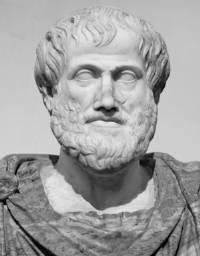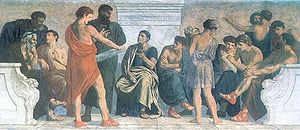Aristotle
Biography
|
|
EUGENE M. MCCARTHY, PHD

|
Aristotle (384-322 BCE). Greek: Ἀριστοτέλης. Greek philosopher and scientist. Set up an organized framework of knowledge that served as the foundation for much of the science and philosophy of ancient and medieval times, and therefore for science of the present day. The tutor of Alexander the Great, he is sometimes called the father of biology.
Aristotle's most important extant works in connection with biology are his Historia animalium (Enquiry into Animals), De motu animalium (On the Motion of Animals), De incessu animalium (On the Gait of Animals), De partibus animalium (On the Parts of Animals), and De generation animalium (On the Generation of Animals). When read from the standpoint of modern knowledge of the subject, these books are obviously riddled with error, myth, and rumor, but they nevertheless served as the starting point of all subsequent biological thought and are the ultimate source of natural history as a field of study. With Alexander as his patron, he was able to describe plant and animal specimens received from all parts of the far-flung Alexandrian empire.
At the age of fifty, after Alexander ascended the Macedonian throne and set out on his conquests, Aristotle returned to Athens, where he had been a student under Plato for twenty years (367-347). There he founded a school at the Lyceum gymnasium, because as a foreigner he could not own property. The school itself became known as the Lyceum. It was also known as the Peripatetic School. Among his students was Theophrastus, who compiled the most important works on botany written in the ancient world.
| Other early biologists: |
It has often been argued that Aristotle's philosophy is inconsistent with the occurrence of organic evolution. That is, under his philosophy each living thing is defined by an immutable underlying essence. Since each living thing's essence is unchanging under this view, it seems there is no room for evolutionary change. However, he did in fact speculate on the origin of useful traits. In this connection, he explicitly stated that different types of organisms would be expected to differ in their ability to survive, depending on the traits they possessed. Therefore, there could be natural selection among distinct forms of life. This view is consistent with evolution of the type described by stabilization theory on this website (although it does not agree well with the sort of evolutionary processes described by Darwin).

|
| The Lyceum |
Most shared on Macroevolution.net:
Human Origins: Are we hybrids?
On the Origins of New Forms of Life
Mammalian Hybrids
Cat-rabbit Hybrids: Fact or fiction?
Famous Biologists
Dog-cow Hybrids
Georges Cuvier: A Biography
Prothero: A Rebuttal
Branches of Biology
Dog-fox Hybrids